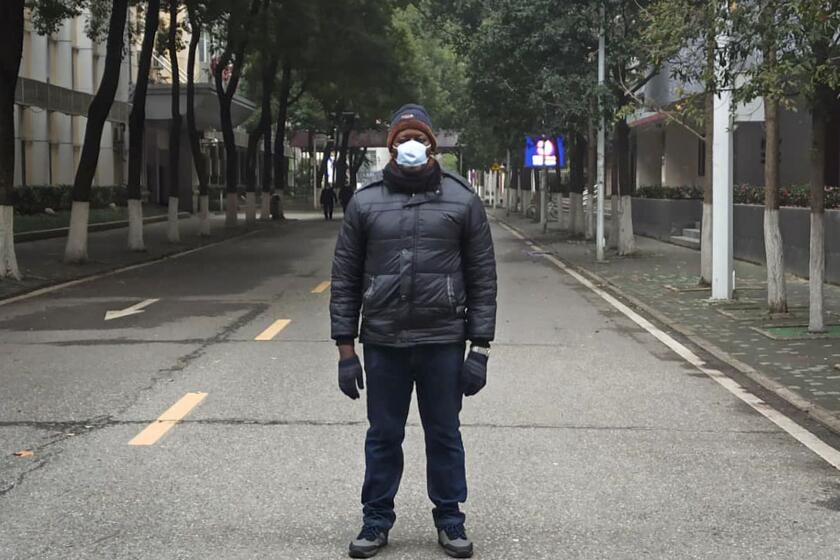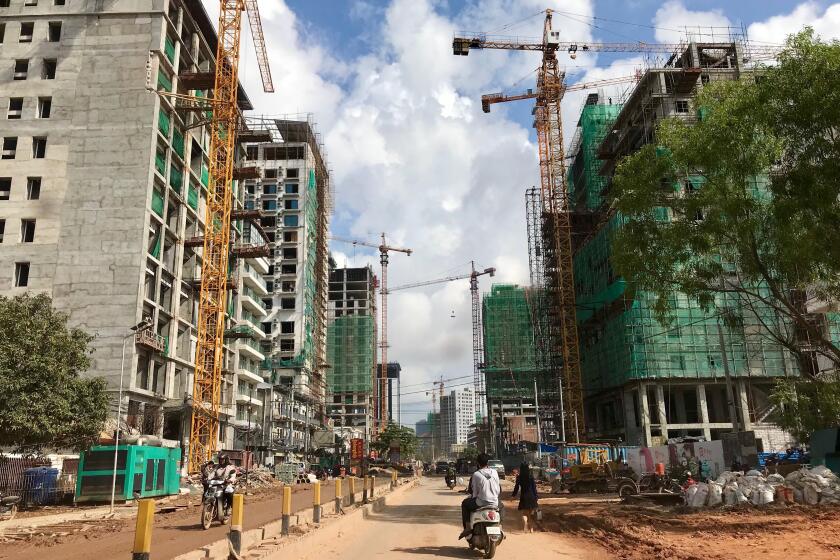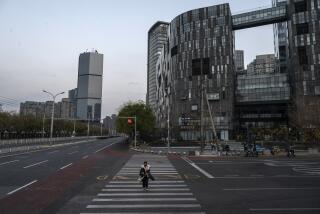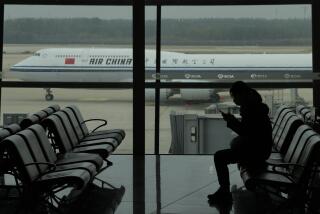These Pakistani students want out of coronavirus-stricken Chinese city. Their government says no
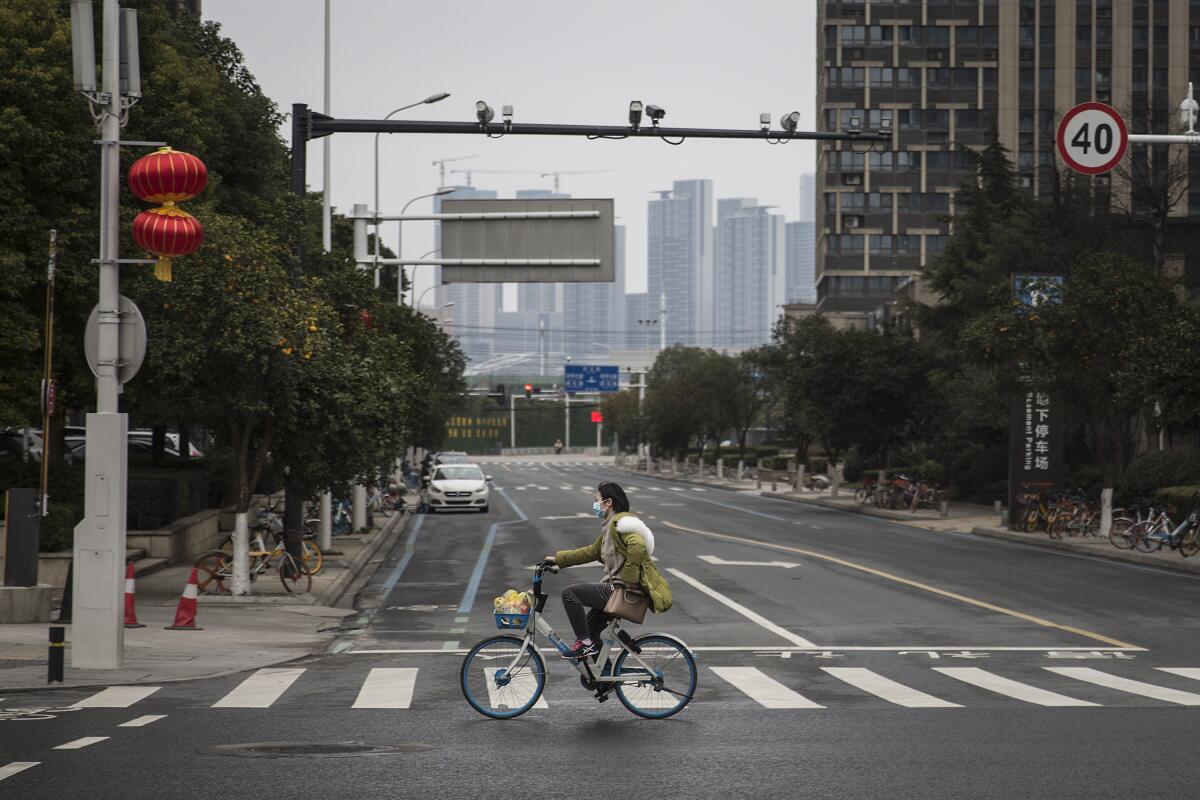
On Thursday, for the first time in a week, Abdullah left his small dorm room at the Wuhan University of Technology in China to buy fruit and spices to cook the food of his native Pakistan.
As the Chinese city of Wuhan is gripped by the coronavirus outbreak, Abdullah and hundreds of Pakistani students are locked down on their campuses, barred by university officials from leaving for days at a time, phone and WeChat messages their only link to the dire situation outside their doors.
“I spend almost 10 hours a day on the phone talking to my family and friends back in Pakistan,” said the 26-year-old doctoral student, who asked that his full name not be used for fear of reprisals from either his government or China’s. “There is nothing to do in this small room. I fear that I’ll go mad in the next few days.”
While more than 20 countries have evacuated their nationals from Wuhan, the epicenter of the outbreak that has sickened more than 60,000 people worldwide since December, Pakistan has resisted calls to bring home several hundred increasingly worried citizens, many of them students.
For Prime Minister Imran Khan, the decision hinges on health as well as politics.
Officials say Pakistan lacks the capacity to deal with an epidemic if large numbers of infected people reach its shores. But China is also one of Pakistan’s most important allies and benefactors, and analysts say that Khan is attempting to show solidarity with Chinese President Xi Jinping by insisting Pakistani students are safe and well cared for in Wuhan.
“Pakistan stands with the people & govt of China in their difficult & trying time and it will always stand by them,” Khan tweeted Wednesday. “We will be extending every material & moral support to China just as China has always stood by us during all our times of trial and tribulation.”
Khan said he had instructed his Foreign Affairs Ministry “to do everything possible for our students who are stuck in Wuhan,” but officials said that would not include bringing them home. Flights from China to Pakistan are operating, but students cannot leave Wuhan without government approval.
While citizens of wealthy countries prepare to be evacuated from China’s locked-down city of Wuhan, African students see little chance of escape.
A foreign ministry official, speaking on condition of anonymity to discuss the government’s thinking, said that keeping the students in Wuhan was “in the best interests of the students and Pakistan,” and added that the World Health Organization had said that evacuations were not necessary.
“We all know the health infrastructure in Pakistan is not capable of dealing with such epidemics,” the official said. “It could have devastating implications for Pakistan and families of the students if some infected students come back.”
The United States, Canada, Singapore, the Philippines, Uzbekistan, Saudi Arabia, Indonesia and Thailand are among the countries that have flown citizens home from parts of China that have been hit by the outbreak. Pakistan and Cambodia, another country with close ties to Beijing, stand out for saying they will not carry out evacuations.
Hun Sen, Cambodia’s authoritarian prime minister, said bluntly that his decision was a kind of “soft diplomacy” and a form of thanks to China, his country’s No. 1 trading partner and source of tourism.
“We are keeping [Cambodian students] there to share [Chinese people’s] happiness and pain and to help them solve this situation,” Hun Sen said last month.
Bradley Jensen Murg, an assistant professor of political science at Seattle Pacific University, said Hun Sen’s decision came down to his country’s “very close relationship with Beijing.”
“Cambodia acted as it normally does in situations where China has a strong and clearly enunciated interest: It adhered to Beijing’s demands,” Murg said.
A deadly building collapse in Cambodia exposes the dark side of Chinese investment in emerging economies.
For financially strapped Pakistan, locked in a blood feud with neighboring India and increasingly estranged from the U.S., its longtime ally, China represents the last major nation it can count on. Beijing has pledged tens of billions of dollars in grants and loans to Pakistan under Xi’s Belt and Road infrastructure program.
“Owing to our historic, long relationship and trust in our iron brother China, the Pakistani government decided to follow international practices and standards in such emergency situations and believed that China is going to stamp this virus out soon,” said Hamayoun Khan, secretary general of the Pakistan Council on China, a private think tank.
“Pakistani citizens will be more comfortable in terms of available medical infrastructure and facilities in China than in Pakistan,” Khan added.
As families and opposition politicians call for bringing the students home, Khan’s government has tried to reassure people it is closely monitoring their status. Zafar Mirza, Khan’s advisor on health issues, spoke to students in Hubei this week via Skype and said he “reassured them we are doing everything to make sure they are taken care of.”
“China also committed to taking care of Pakistan students like their own children,” Mirza tweeted.
For the roughly 800 Pakistani students in Wuhan, their government’s words ring hollow.
“We acknowledge the efforts of Chinese authorities to support us during these tough times. But we want to go back to Pakistan,” Abdullah said. “We are ready to put ourselves in quarantine for two weeks [if brought back to Pakistan], but don’t leave us here.”
Panicked shoppers formed long lines outside grocery and drugstores in Taiwan, Hong Kong and Singapore to snatch up staples in case the coronavirus crisis worsens.
Abdullah said that at least four Pakistani students had tested positive for the coronavirus since last month. All have been treated and released from hospitals, he said.
There are normally about 1,300 Pakistani students enrolled at 25 universities in Wuhan, a city of 11 million in central China. About 500 students left China due to school holidays before the outbreak, students said.
For those left, life is increasingly limited. Abdullah, who stayed behind over the holiday to complete projects in the university lab, said the university was providing them with basic food. But he had to argue with staff at his dormitory for three hours to get permission to step outside for two hours Thursday.
He went looking for fresh fruit and spices but found that almost every shop on campus was closed, and that one didn’t have anything he wanted. He saw only one other person walking around campus, wearing a mask.
Depressed, he returned to his room after 45 minutes.
Special correspondent Sahi reported from Islamabad and Times staff writer Bengali from Singapore.
More to Read
Start your day right
Sign up for Essential California for news, features and recommendations from the L.A. Times and beyond in your inbox six days a week.
You may occasionally receive promotional content from the Los Angeles Times.
